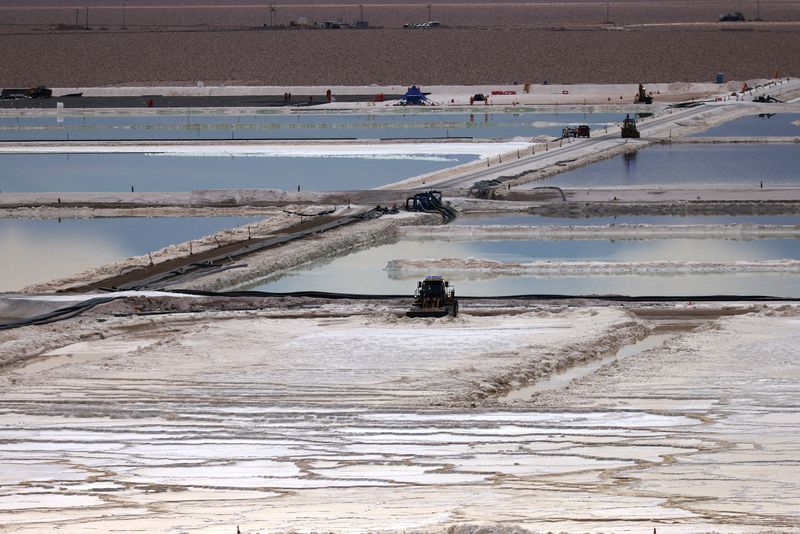By Melanie Burton and Scott Murdoch
MELBOURNE (Reuters) - Emerging Australian lithium companies are witnessing a surge in buyouts as their lower valuations and cash needs attract some of the world's top producers of the battery material and other suitors who are racing to secure supplies.
Driven by receding prices of lithium and by major producer Chile nationalising the industry earlier this year, companies such as Albemarle (NYSE:ALB) Corp, the world's biggest lithium producer, have been sniffing around for buys in Australia, which makes the most lithium in the world and has more than 80 lithium-related companies listed on its main stock exchange.
However, they are reluctant to pay up for listed producers whose market valuations have sky-rocketed on the back of booming prices, while offers have been rebuffed on the promise of soaring demand to come from sales of electric vehicles and the lithium-loaded batteries that power them.
That is forcing acquirers to shift their hunt to earlier stage lithium developers, including some who are drilling to quantify reserves, according to bankers, lawyers and mining analysts. Many of these firms are less pricey and are hungry for funds as they ramp up their activities.
"It seems like the cheapest way to get lithium units is via the drill bit," said analyst Kaan Peker of RBC in Sydney. "We'll see a lot of the exploration companies looking to increase their resources and reserves, so that usually puts them front of mind with the producers which are cashed up. So I think there's going to be some opportunistic acquisitions."
There is already evidence of frenzied deal activity involving pre-producing companies. Develop Global, a base metals explorer backed by diversified miner Mineral Resources, last month proposed to acquire lithium developer Essential Metals for A$152.6 million ($97.98 million). Essential Metals aims to ship ore by 2025.
And Chile's SQM, the world's second-biggest lithium producer, made an offer last month for Azure Minerals after buying a 19.95% stake in it for A$20 million in March.
Azure, which is developing the Andover lithium project and has ambitions to be in production by 2030, said last week it had rebuffed the offer.
Albemarle's $3.7 billion bid earlier in 2023 for Liontown Resources before it starts producing the material next year was also rejected.
The deals mania comes as Australia is implementing a critical minerals strategy that envisages significant collaborations with investors and international partners in order to become a renewables superpower.
The country, which supplies around half of the world's lithium, needs A$100 billion of strategic national interest capital to attract A$200 billion-A$300 billion of private investment to turn the country into a clean energy powerhouse, according to Australian think-tank Climate Capital Forum.
Consultancy WoodMackenzie expects global demand for EV battery materials to grow five-fold by 2030.
"Even though battery chemistry is evolving and impacting certain metals, lithium is a mainstay and the demand story remains robust. The battery metals landscape, and lithium in particular, looks poised for further M&A activity,” said Gavi Friedland, head of metals and mining at Goldman Sachs in Australia & New Zealand.
TACTICAL BUYERS
Consolidation of the industry is also being driven by companies expanding activities across the value chain.
Mineral Resources is deciding whether to build an Australian lithium battery chemical plant, while Albemarle is expanding production at its Kemerton hydroxide plant and SQM is also building a lithium hydroxide plant.
"Downstream facilities need product, so that continues to drive M&A," said Guy Alexander, head of M&A at law firm Allens.
Buyers want to put their foot on supply early ahead of a supply gap that will widen from around 2030, he said.
"I think there's still going to be more in this for the next couple of years."
Tactical buyers from major automobile producing nations could also step up their M&A deals.
Japan's Idemitsu raised its stake in developer Delta Lithium to 15% in June. Delta plans to start mining at its Mt Ida lithium project later this year.
“The inbound investment trend will continue,” said Tony Chong, a partner at law firm Squire Patton Boggs in Perth, adding that he expected to see more Japanese interest in Australian projects.
China's critical minerals interest, however, could be limited by national security concerns as Australia has been vocal in prioritising investment from its allies and blocked the acquisition of the Bald Hill lithium mine last month by a China-linked firm.
Australian projects also face increasing competition for suitors from Canadian ones, partly because of Canada's proximity to the U.S., the world's second-largest auto market.
Rio Tinto (NYSE:RIO) is looking at "a number of possible lithium opportunities" in a "pretty hot market" but any purchases require discipline, CEO Jakob Stausholm said earlier this month.
The world's second-biggest miner would not mind a lithium asset in Canada, Stausholm said.
And, Albemarle this month took a 5% stake in Patriot Metals, whose Corvette project in Quebec is not expected to be in production until the end of the decade.
But the Australians are not too worried.
"I guess Canada as a region,...is probably not as quick as Australia in terms of approvals and development timelines," Dale Henderson, CEO of independent lithium miner Pilbara Minerals whose market capitalisation has zoomed to A$14.5 billion now from around A$40 million in early 2020, told Reuters last month.

"I also see moves afoot to try to accelerate that. It will be interesting to see how that (industry) develops."
($1 = 1.5574 Australian dollars)